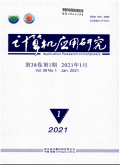计算机应用研究2024,Vol.41Issue(4):995-1000,6.DOI:10.19734/j.issn.1001-3695.2023.07.0338
CS-Raft:适用于联盟链的拜占庭容错共识算法
CS-Raft:Byzantine fault tolerant consensus algorithm for consortium chains
摘要
Abstract
This paper proposed a credit-score-based Byzantine fault-tolerant consensus algorithm,called CS-Raft,to address the inadequate performance of the current consensus algorithms in consortium chains.Initially,it assigned credit score attributes to all nodes and updated the credit score of each node according to their consensus behavior,activity level,time of joining the cluster and other metrics.The higher the credit score,the higher the node's trustworthiness.Secondly,it selected monitoring nodes based on their credit scores,which had the authority to inspect and participate in leader elections.The setting of monito-ring nodes could effectively resist attacks from Byzantine malicious nodes.Finally,it made improvements to address the issue of vote splitting in leader elections,thereby enhancing the speed of leader election.Experimental analysis shows that compared to the PBFT algorithm,the CS-Raft algorithm effectively reduces consensus latency,increases system throughput,and accelerates leader election speed while achieving Byzantine fault tolerance.关键词
联盟链/拜占庭容错/共识算法/信用评分Key words
consortium blockchain/Byzantine fault tolerance/consensus algorithm/credit score分类
信息技术与安全科学引用本文复制引用
翟社平,聂浩楠,陆娴婧,杨锐..CS-Raft:适用于联盟链的拜占庭容错共识算法[J].计算机应用研究,2024,41(4):995-1000,6.基金项目
国家自然科学基金资助项目(61373116) (61373116)
工业和信息化部通信软科学项目(2018-R-26) (2018-R-26)
陕西省重点研发计划资助项目(2022GY-038) (2022GY-038)
陕西省大学生创新创业计划训练项目(202211664016) (202211664016)
陕西省教育厅科学研究计划资助项目(18JK0697) (18JK0697)
陕西省社会科学基金资助项目(2016N008) (2016N008)
西安市社会科学规划基金资助项目(17X63) (17X63)
西安邮电大学研究生创新基金资助项目(CXJJYL2021050) (CXJJYL2021050)

